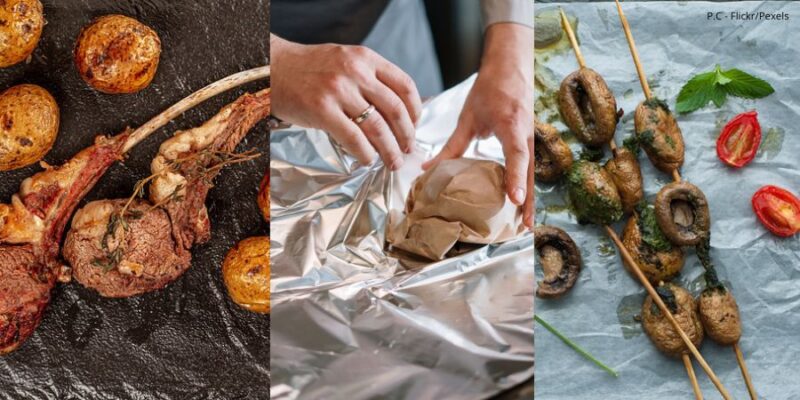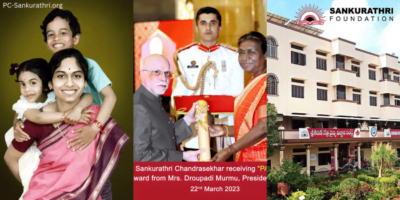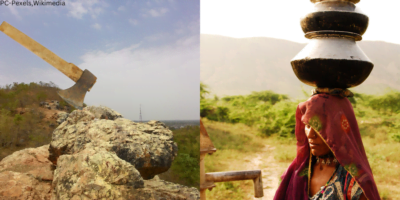This is the story of traditional food Wazwan, the culture of Kashmir, grandeur of India in the background of the world. This cultural extract of India is inspiring, motivating and teaching for all of us – each home – each city. We all need to understand the importance of sustainable living, which knowingly – unknowingly the valley of Kashmir is already practising.
Nature has a lot to offer to its children, food-water-air, land to live on, and a sky to hope on. Because we have vast natural resources available to us, we do not wisely use them. We consume much more than we need. There is a limit to everything on this planet, and we are now snatching much more from nature than it can afford. Out of all the many, ‘food’ is also a thing that we are taking for granted, today food shortage is a global problem.

The United Nations Environment Programme estimates that 931 million tonnes of food waste are created globally each year, of which 569 tonnes (or more than 60%) are generated by homes. Many people are trying to pull the situation, one of the examples is Robin Hood Army – Combating Hunger For 8 Years, 13 Countries, 2 lakh Robins, Feeding 100 Million+ but more such initiatives are required.
Wazwan
India has always been a world leader, a teacher and a motivator when it comes to culture and lifestyle. List of the Indian contributions to the world is endless, say for example we have 10 Great Indian Inventions That We Thought Were Foreign But Originated In India.
Kashmir is renowned all around the globe for its regal cuisine, known as “Wazwan.” It is a multi-course feast that features some vegetarian items but is predominately non-vegetarian. It is offered at significant social gatherings, most notably wedding ceremonies. On highly significant family occasions, nearly 30 dishes are provided in the Wazwan.

An average of 5 to 6 kg of mutton is usually served to 4 persons at such significant ceremonies. A minimum of 3 kg of mutton is served for additional guests who are called over for dinner or lunch. On Trami, a Kashmiri copper dish designed for four persons.
There is no well-known research on the patterns of food consumption during such occurrences in Kashmir. According to unofficial data, there are, on average, at least 2000 wedding functions held each day in the Kashmir valley alone from May to November each year.
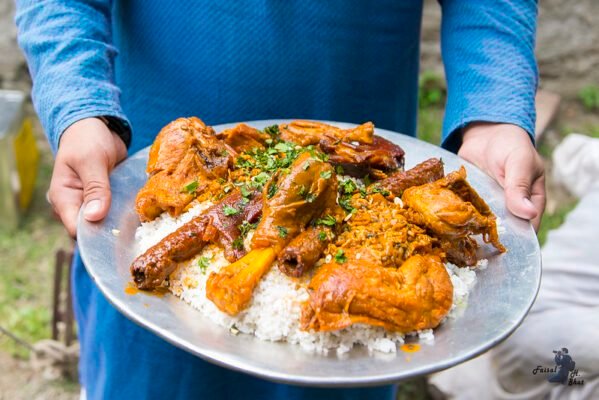
On average, 200 kg of mutton is needed to prepare Wazwan dishes for each wedding function during these events. The Kashmir valley alone consumes 4 lakh kg of mutton per day for wedding ceremonies approximately.
Wazwan Means An Abundance 0f Food
Over 2 lakh kg of mutton would have been wasted daily if Kashmiri residents hadn’t been bringing the remaining wazwan dishes with them. YES, THEY HAVE A WAY TO USE IT ALL. They take the extra home.
Only Kashmiri women would previously take extra mutton dishes by packing them into old newspapers or plastic bags that they’d carry. With time, this tradition became popular, and men soon began travelling with the remaining mutton on their Trami. The guests found it challenging to eat everything as the number of items in wazwan grew from 7 to 12, then 30 or more.

Back then only some people would bring leftover food with them, but many were hesitant because this was regarded as impolite behaviour. However, the hosts started handing out extra bags to put leftover food in the early 1990s. The host has been serving the wazwan feast in specially made food packets for the past 20 to 25 years.
Within a year or so, individuals in cities and towns began to follow what had begun in rural areas. In Kashmir, taking leftover food into carrying bags evolved into a movement, and people also granted it social legitimacy. This fashion is now, in some ways, ingrained in the Kashmiri Wazwan culture. over time, even the elites joined the cause and began providing specially made carry bags of leftover food.
Now Kashmiri wazwan culture includes taking the leftover food from wedding receptions (dinner or lunch) and other events with us.
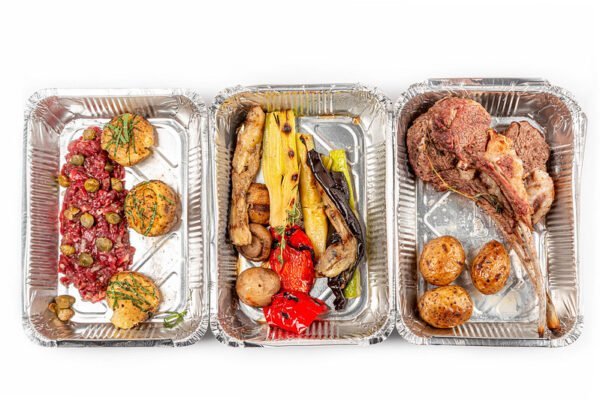
In actuality, this is a success story for reducing food waste. And anything left even after this is provided to animals like dogs or cattle etc, even the extra rice is not squandered during wedding festivities.
Even though it is excessive to use quintals of mutton to prepare thirty dishes of wazwan, it is still preferable when all the remaining foodstuff (wazwan dishes) is used wisely. People carry this leftover food, which is subsequently kept at home in a refrigerator.
Every member of the family enjoys the same dish for one or two nights. Everyone in Kashmir continues to adhere to this significant societal & cultural change that has occurred over the past 30 years, regardless of wealth or education. Even the elites who opposed it in the past are now becoming more accepting of this new enculturation. Not just Kashmiri Wazwan, in almost all the states of the country such practice of sharing food after an important celebration can be observed.
Food waste is a worldwide problem, and industrialised countries like France, Germany, Australia, China, and others must learn from India to solve the problem. Indian culture is full of stories that inspire and teach the way of living a successful and sustainable life, explore more of these stories with mad4india.
If you loved reading this story, you can also read about Dr Vivek Bindra – The Man Who is Inspiring India’s Youth And Making Them Future Leaders
If you know more inspirational stories about any person, company, new idea, or social initiative, write to us on mad4india.com, or share such information with us on Facebook or LinkedIn.
